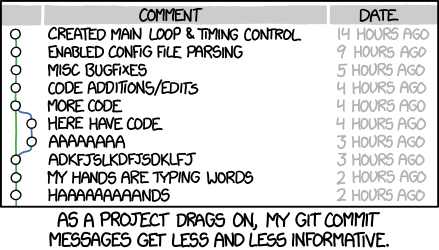Intro to Git
Obligitory XKCD

It's really pretty simple...
Git is a tool for snapshotting with some really powerful tools for navigating and combining those snapshotsInstallation
Follow Instructions
Initial configuration
Some common configuration options here. At a bare minimum, make sure you set your name and email
$ git config --global user.name "John Iacona"
$ git config --global user.email j.iacona@kew.org
Github
Repo exists on Github, you want it on your computer
$ git clone git@github.com:RBGKew/bioinfo-utils.git
Code exists on your computer, you want it on Github
$ git init
$ git remote add origin git@github.com:RBGKew/shiny-new-repository.git
$ git add .
$ git push -u origin master
File lifecycle
A file can exist in one of 4 states in git
- Untracked
- Modified
- Staged
- Committed
git status is your friendUntracked
Create a new file for your bio and add it to git
$ vim docs/people/john-iacona.md
$ git add docs/people/john-iacona.md
Modified
Add your bio and see what has changed
$ vim docs/people/john-iacona.md
$ git diff
Staged
Once you are happy with your changes, add them to the staging area
$ git add docs/people/john-iacona.md
Committed
Finally, make an official snapshot of all staged changes
$ git commit -m "Super useful commit message"
Aside about commit messages
other obligatory xkcd...

Commit messages should document what you have done for others and your future-self
Think about what you've done
$ git log
$ git lol
$ git lola
Push it (real good)
Remote
Another copy of a repo.origin is the most common
$ git push -u origin HEAD
So fetch
If the remote repo has progressed beyond yours, you have tofetch changes and merge them with yours
$ git fetch
$ git merge origin/master
fetch vs. pull
pull tries to fetch and merge in one step.
$ git pull